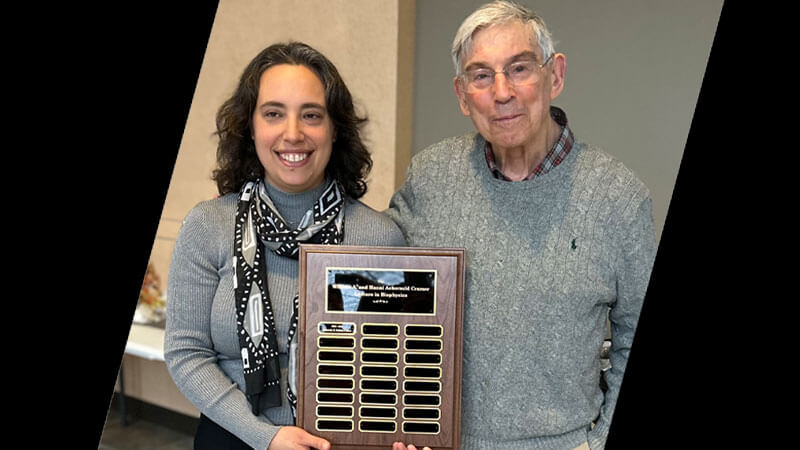Inaugural Cramer lecture: A new chapter in molecular biophysics at Purdue University

WEST LAFAYETTE, Ind. – Purdue University’s Department of Biological Sciences recently held the inaugural lecture of the new William A. and Hanni Aebersold Cramer Lectures in Biophysics Series. Funded by William Cramer, the emeritus Henry Koffler Distinguished Professor of Biological Sciences, and his wife, the lecture series was established as a testament to the couple’s commitment to advance molecular biophysics research and education at Purdue. Their donation will support the annual lecture series for more than 10 years.
Cramer is celebrated for pioneering work on membrane proteins that greatly expanded the understanding of cellular processes and diseases. His key contributions, particularly on the cytochrome b6f complex in photosynthetic electron transport and energy transduction, have significantly impacted the understanding of bioenergetics. His research into the structure-function relationships of proteins, notably alpha-synuclein, also has paved new avenues in Parkinson’s disease research that highlight the pathological role of protein-membrane interactions.
The lecture series, which complements the mission of PI4D, the Purdue Institute of Inflammation, Immunology and Infectious Disease, of which Cramer is a member, is designed to bring world-renowned researchers to Purdue University. The lectures emphasize student involvement, according to Thomas Sors, director of scientific strategy and relations for PI4D.
“Predoctoral trainees from the NIH-funded Molecular Biophysics Training Program (grant No. 5 T32GM132024-05) play a central role in selecting and hosting speakers, fostering a rich environment of scientific inquiry and collaboration,” Sors said. “We are very grateful to the Cramers for their generous support.”
The first of the annual lectures was recently held and featured Gabriela Schlau-Cohen, associate professor of chemistry at Massachusetts Institute of Technology, whose interdisciplinary research bridges chemistry, biology and physics. Her exploration of light-harvesting systems for solar energy research and receptor proteins for therapeutics mirrors the Cramer lecture’s principles of multidisciplinary innovation.
While paying homage to the Cramers’ vision, the lecture series also positions Purdue at the forefront of scientific exploration and education in molecular biophysics. This platform is positioned to ignite future discoveries and foster collaborations that will shape the landscape of biological research.
Writer/Media contact: Amy Raley, araley@purdue.edu
Source: Thomas Sors, tsors@purdue.edu